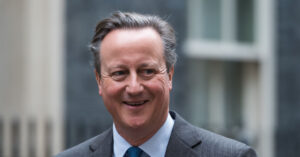The Westminster bush drums are beating out a death-tattoo for Rishi Sunak. Having been installed to replace the Tory membership’s own preferred candidate after her politics offended the City of London, Sunak has led the Conservative Party to a record low in popular approval. Now, rumour has it that a desperate plot is afoot in the party to replace him with Penny Mordaunt.
Mordaunt? Really? Cynics may sneer that the chief argument in her favour is that she looked good carrying a sword. Implicitly: she has the kind of robust Anglo-Saxon bearing once associated with gymkhanas and provincial church fêtes, and as such might — perhaps — inspire a twitch or two of something approximating libido dominandi among those superannuated Shire Tories whose constituencies remain, through economic luck or Nimbyism, relatively untouched by Britain’s headlong Tory-managed decline. If, as a party, you’re now banking on fighting the next election from the Helm’s Deep of mid-Bedfordshire and the South Downs, maybe Penny Mordaunt really is the least worst option. Against that, we might retort that when you scratch the surface of Penny Mordaunt you find that there really is nothing but surface. But in truth it’s precisely this quality that makes her an even more ideal head for the increasingly headless Tory Party, better than the perhaps soon-to-be-beheaded Rishi Sunak.
Perhaps the first and most prescient prophet of such a politics of headlessness was the French Surrealist writer Georges Bataille. In 1936, he released the first issue of Acéphale (Headless), in which he denounced rationality and the principle of leadership, claiming: “Human life is defeated because it serves as the head and reason of the universe. Insofar as it becomes that head and reason it accepts slavery.” Over the same period, he and his circle formed a secret society with the same name, in which members meditated on texts that seemed to promise acéphalité, or headlessness: a vision of human social transformation away from order, prohibition, and constraint towards worldly desires, and spontaneous, shifting forms of self-organisation.
It’s rumoured that the Acéphale society wanted to arrange a real human sacrifice, but that although several members volunteered to be killed they were unable to find anyone willing to perform the execution. By contrast, it’s clear from the number of Tory leaders since 2019 — Mordaunt would be the fourth since the last election, of which three were elected without going to the country — that whatever else the party lacks, it has no shortage of head-removers.
The logical end-point of this trajectory is a state of permanent leadership contest, during which (in the style of Belgium) the functions of state somehow trundle on in a state of acéphalité: without a formal head. In the case of Belgium, this works because the government is already very devolved; in the case of Britain, though, when all leaders seem to be temporary stand-ins who is really in charge? Ironically, the current Tory administration owes its now swiftly dwindling majority to the Johnson-era promise of answering this question — by delivering the electorate from precisely this kind of leaderless bureaucracy.
Back in 2019, Johnson won his landslide by promising to scotch the Blob and “Get Brexit Done”, thereby defying every bureaucrat, NGO-crat and Sensible Centrist who was seeking to circumvent the referendum result. He gained his mandate and Brexit was duly Done; but the power of the Blob was in no way scotched, as evidenced by the fact that Brexit did not get Done in any of the ways that actually mattered to the electorate. Nor was it Done in any way that limited those judicial, regulatory, and other extra-political curbs that have come increasingly to characterise British public life, and whose impositions on parliamentary sovereignty and popular preference occasion such widespread resentment. (Once the cost of all the lawfare is added in, for example, even if it passes the proposed “Rwanda plan” is projected to cost £1.8m per migrant.)
But what if Brexit in this sense can’t be done? Since the referendum, I’ve found myself wondering whether the project failed, at least in its populist incarnation, because it was impossible. Impossible because we’ve somehow concocted for ourselves a civilisational order that’s too complex and rudderless for even intelligent non-specialists to govern competently. When, for example, just the safeguarding guidelines for schools run to 178 pages, and there are also curricula, budgets, estates unions, pay, funding, meals, and much else besides all clamouring for attention, is it really reasonable to expect all of the Secretaries of State for Education to have acquired a complete mastery of their brief, in the sometimes very short (there were five in 2022 alone) time they spend in the job?
But this has some less than appealing implications for how government actually works. It suggests that the majority of expertise really does rest with the headless Blob of appointees, NGOs, procedures, and interchangeable bureaucrats, that populists so viscerally loathe. But what’s the alternative? Without it, we are surely just hurtling from calamity to cock-up with a leadership of under-informed blowhards.
A third option, and the one I suspect we now enjoy, is governance in practice by the former, with the latter granted a sort of ceremonial role. As though, perhaps somewhere around the point where we gained a Supreme Court, the doctrine of Parliamentary supremacy was discarded, much as absolute monarchy was in 1688. The settlement we ended up with, after absolute monarchy was abolished, was known as “the Crown in Parliament”: constitutional monarchy, which is to say a defanged monarchy that serves as the symbolic head of a sovereign Parliament. What if, much as after 1688 we retained only a constitutional monarch, now we also only have a constitutional Parliament? Perhaps, to save our overburdened education secretaries, we set the machine on autopilot — and now we’ve forgotten how to fly the plane. If so, no one is really in charge — but a kind of headless swarm now wields authority.
That would make Britain’s de facto regime “the Crown in Parliament in the Blob”. If this is in fact how we’re ruled now, it would explain several otherwise baffling features of contemporary politics — not least the Royal Family’s current sense of both crisis and bathos. If we’ve moved to a constitutional Parliament, the living representative of the Crown in Parliament, Charles III, is now the ceremonial centrepiece of a Parliament that has itself become ceremonial. Even more than his current illness, this would help explain the sense of a once-magnificent institution ending not with a bang, but a whimper.
It’s hardly original to note how hopelessly the Conservative Party lags His Majesty’s Opposition, in grasping how this now vocal, organised, and well-resourced post-political ecosystem works. From Thatcher on, every Tory leader has made angry gestures at the Blob, while doing little either to dislodge prominent enemies within it or even cut funding to groups that oppose stated Tory aims. Despite noises to the contrary, this only grew more pronounced under Johnson and subsequent Tory leaders. By contrast, Starmer’s government-in-waiting is already making repeated assurances to that ecosystem that Labour will keep the funding spigots open, and efforts at control to a minimum.
We can assume, then, that whether endured resentfully or supported enthusiastically, this new order of constitutional Parliament will shamble on, at the head of a headless state, for which Penny Mordaunt would be the perfect, interim, largely symbolic head. For notwithstanding her jam-and-Jerusalem aesthetics, Mordaunt herself is the epitome of steely-eyed Blob ambition. After an early career oscillating through an ecosystem of PR, student politics, third-sector administration, and political campaigning, she joined Parliament as that most pro-Blob of Tories: a Cameroon. Since then, she’s risen without trace; apart from carrying the sword, the moment she came closest to being noticed by the public was after her defeat by Liz Truss in the last Tory leadership bloodbath but one.
There, she was castigated by the Tory membership over her enthusiastic support for the most totemic Blob issue of all: gender ideology. No project better embodies the headless constitutional-Parliamentary fondness for managerial abstraction over material reality, than the drive to enforce formal sex equality by government fiat. And no figure better embodies than Penny Mordaunt the reality that where the Tory membership genuinely opposes this order, the Tory leadership only affects to do so.
Meanwhile, if the Blob (including its Tory components) reveals its seeming debt to Bataille in a reflexive instinct to amplify every every marginal grotesquerie, it does so too in another key characteristic: wielding influence via elite groups with closed membership, and equally closed objectives. In practice, of course, most of these have less flagrantly occult aesthetics than Bataille’s Acéphale group. Unlike them, they don’t meet by a lightning-struck oak tree; they have dull offices, stodgy mission statements, and annual filings to the Charity Commission. But they remain closed, vanguardist bodies. And their relation to official forms of power is hence every bit as oblique as in any other closed society.
No one knows how — or even if — any of this can be changed or reversed as things stand. Perhaps the age of intelligent, elected non-specialists really is over. In that case, the Labour approach of leaning enthusiastically into relationship with the Blob may make more sense than the Tory one of doing so grudgingly, while making rude gestures and frantically appointing and then beheading new heads. Certainly, if we’re stuck with this new regime, we must learn to ask a great deal more of our unelected “experts” — and find new means of holding them accountable.
For beneath the jolly hockey-sticks veneer, Mordaunt is herself an empty cipher for a Blob the Tory membership despises, but that its leadership quietly knows it cannot do without. She would do nothing to curb the current withdrawal of real power into closed cabals and permanent bureaucratic revolution. And once herself inevitably decapitated, she would be as certain as Sunak is to merge seamlessly with that ecosystem once again. At least, in the the interval, we might perhaps take comfort from the fact she looked good with that sword.
Disclaimer
Some of the posts we share are controversial and we do not necessarily agree with them in the whole extend. Sometimes we agree with the content or part of it but we do not agree with the narration or language. Nevertheless we find them somehow interesting, valuable and/or informative or we share them, because we strongly believe in freedom of speech, free press and journalism. We strongly encourage you to have a critical approach to all the content, do your own research and analysis to build your own opinion.
We would be glad to have your feedback.
Source: UnHerd Read the original article here: https://unherd.com/



